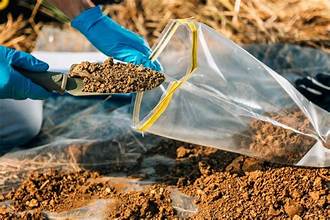Soil Testing
Soil Testing: Unlocking the Secrets of Your Soil for Optimal Growth
Introduction
Soil testing is a crucial process in modern agriculture and gardening, providing
essential insights into soil health and fertility. By analyzing the composition and
properties of the soil, you can make informed decisions that enhance plant growth,
maximize yields, and ensure sustainable land management. This page offers
comprehensive information about soil testing, its various types, procedures,
benefits, and how it can transform your gardening or farming practices.
What is Soil Testing?
Soil testing involves analyzing a soil sample to determine its physical and chemical properties. The results of soil tests provide valuable information on nutrient levels, pH balance, and soil texture, which are essential for making informed decisions about soil management and crop production. By understanding the soil's condition, you can tailor your fertilization, irrigation, and cultivation practices to meet the specific needs of your plants.
Types of Soil Tests
pH Testing
Description: Measures the acidity or alkalinity of the soil.
Importance: Soil pH affects nutrient availability and microbial activity. Most plants thrive in a pH range of 6.0 to 7.0.
Procedure: A soil sample is mixed with water and tested using a pH meter or indicator strips.
Nutrient Testing
Description: Determines the levels of essential nutrients such as nitrogen (N), phosphorus (P), and potassium (K), as well as secondary and micronutrients.
Importance: Helps in understanding soil fertility and the need for additional fertilization.
Procedure: Soil samples are analyzed in a laboratory to measure nutrient concentrations.
Texture Analysis
Description: Assesses the proportion of sand, silt, and clay in the soil.
Importance: Soil texture influences water retention, drainage, and root growth. It affects soil structure and overall health.
Procedure: A soil sample is subjected to a textural analysis using sedimentation or mechanical methods.
Organic Matter Content
Description: Measures the amount of decomposed plant and animal material in the soil.
Importance: Organic matter improves soil structure, water-holding capacity, and nutrient availability.
Procedure: Soil is treated with chemicals that burn off organic material, and the remaining ash is measured.
Soil Moisture Testing
Description: Determines the amount of water present in the soil.
Importance: Essential for managing irrigation and ensuring that plants receive adequate water.
Procedure: Soil samples are weighed before and after drying to calculate moisture content.
Salinity Testing
Description: Measures the concentration of soluble salts in the soil.
Importance: High salinity can inhibit plant growth and reduce crop yields.
Procedure: Soil samples are mixed with water, and the electrical conductivity (EC) is measured.
Soil Testing Procedure
Sample Collection
Selection: Choose representative samples from different areas of the field or garden.
Method: Use a soil probe or trowel to collect samples from the top 6-8 inches of soil. Mix samples from multiple locations to get an average result.
Preparation
Drying: Air-dry the soil samples to remove moisture.
Grinding: Crush and sieve the soil to obtain a fine, homogeneous sample.
Analysis
Laboratory Testing: Send the prepared soil samples to a certified laboratory for analysis.
Results Interpretation: Review the lab report to understand nutrient levels, pH, texture, and other properties.
Recommendations
Fertilization: Based on the test results, apply appropriate fertilizers and soil amendments.
Soil Amendments: Add organic matter or adjust soil pH as needed.
Benefits of Soil Testing
Improves Plant Health
Nutrient Management: Ensures that plants receive the right amount of nutrients for optimal growth.
Prevents Deficiencies: Identifies and addresses nutrient deficiencies before they impact plant health.
Enhances Crop Yields
Optimized Fertilization: Tailored fertilization practices boost crop production and quality.
Efficient Resource Use: Reduces the need for excessive fertilizers and amendments.
Promotes Sustainable Practices
Environmental Protection: Minimizes the risk of nutrient runoff and soil degradation.
Resource Conservation: Helps in efficient use of soil resources and prevents overuse.
Saves Money
Targeted Applications: Reduces the cost of unnecessary fertilizers and soil treatments.
Prevents Over-Fertilization: Avoids wasteful application of nutrients.
Applications of Soil Testing
Agriculture
Crop Management: Optimizes soil conditions for different types of crops.
Precision Farming: Uses data-driven insights for site-specific management practices.
Gardening
Home Gardens: Enhances soil quality and plant health for better results in home gardens.
Landscaping: Improves soil conditions for lawns, shrubs, and ornamental plants.
Environmental Management
Rehabilitation Projects: Assesses soil quality for land reclamation and restoration projects.
Pollution Control: Monitors soil for contaminants and manages soil health.
Conclusion
Soil testing is a fundamental practice for anyone involved in farming, gardening, or land management. By providing detailed insights into soil conditions, it allows you to make informed decisions that enhance plant growth, improve yields, and promote sustainable practices. Regular soil testing helps in maintaining soil health, optimizing resource use, and achieving successful agricultural and gardening outcomes. Invest in soil testing today to unlock the full potential of your soil and ensure a thriving, productive growing environment.


About Agri Agro Grand Expo
Agri Agro Grand Expo International has served as a platform for bringing together many foreign as well as national visitors from all over the country to interact with leading national agriculture technology companies. The Agriculture Expo, held annually, is one of the leading national agriculture events of its kind, showcasing cutting-edge agricultural technologies. This exhibition in India traditionally attracts numerous Ministers of Agriculture, decision-makers, experts, practitioners, and trainers in agriculture, along with thousands of visitors from around the country.
contact :
expo@agriagro.in
exposulabh@agriagro.in
+91-9520099666
+91 -70601 71734
+91 -8791144200
© 2026 Agri Agro Grand Expo All rights reserved.
Mail:
